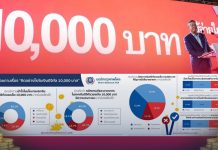BANGKOK, March 26 – Thailand’s trade and investment performance has slipped and now lags behind several neighbouring countries during the last three years, according to the University of the Thai Chamber of Commerce.
Ath Phisalvanich, director of the university’s Centre for International Trade Studies, said today that an evaluation of Thailand’s trade and investment between 2010 and 2012 found that the country has lost its global prominence in rubber and rice exports, with Thailand’s place being taken by Vietnam and Myanmar.

The two Indochina countries have snatched Thailand’s market share in rice, rubber and tapioca, he said.
Thailand has however surged up in exports of automobiles, auto parts and equipment, petroleum products, coal, vegetables and fruits, he added.
Mr Ath reported that Singapore has been the biggest exporter of goods into the Southeast Asian market, having shipped out 18 categories representing 80 per cent of the total export volume in the region. The second and third largest exporters were Thailand and Malaysia.
Regarding foreign direct investment (FDI) in Southeast Asia in the last three years, Singapore had been on top with a total FDI value of US$167 billion, followed by Indonesia (US$51.9 billion), Malaysia (US$31.1 billion) and Thailand (US$27.4 billion).
Foreign investors had become more interested in investing in Cambodia, Laos, Myanmar and Vietnam, he said, indicating that Thailand should not aim at surging to be No.1 in Southeast Asia but rather coordinate with neighbouring countries with an emphasis on a single market which has a combined population of 600 million.
An integration of the region into the ASEAN Economic Community (AEC) will contribute to economic growth among 10 member countries which can rely on each other, he said.
Mr Ath said Thailand needs to improve its manufacturing strength given an export decline in several categories of products especially rubber which saw an export reduction to US$500 million, rice to US$452 million and machinery/electrical appliances/electronics products at US$420 million.
The appreciating Thai currency at over five per cent has negatively affected Thailand’s export competitiveness, he said, adding that Thailand’s economic growth will be 4-8 per cent at an average exchange rate of Bt28-30 against the US dollar.




